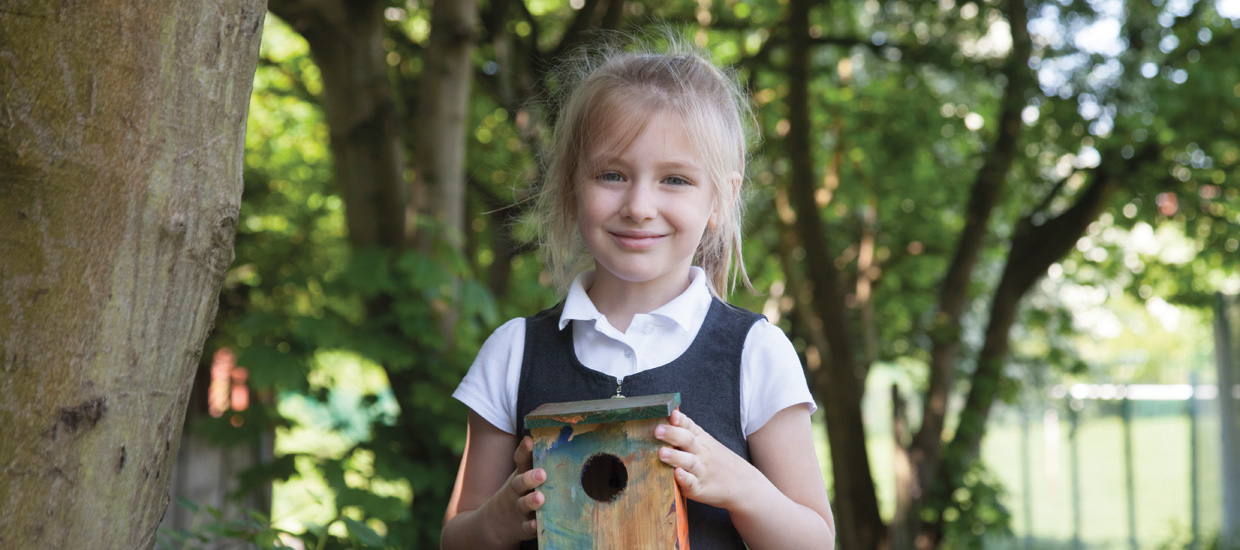Meet the funder: Groundwork
Want to create a greener, more vibrant outdoor space? Groundwork manages a number of grant schemes, helping communities do just this, as Communications Officer Stacey Aplin explains

‘One of the most important things to consider when offering grant funding opportunities to schools is that the application process is simple and easy,’ says Graham Duxbury, National CEO of Groundwork.
‘One resource that Groundwork encourages applicants to read is our online Community Project Toolkit, which provides a wealth of advice, guidance and support for schools and groups wanting to create and sustain successful projects. Our national network of experienced local enablers also means we can help schools apply for funding, recruit volunteers and ensure their projects have maximum impact. It
Bags of possibilities
In October 2015 the Government introduced a law that insisted large businesses (retailers with over 250 employees) start charging 5p for all single-use carrier bags. While the news was met with some cynicism by a minority, the majority saw this as a positive change in the war against plastic pollution.
And it worked – in July 2016 it was reported that England
Groundwork has administered Tesco
Since the scheme launched in 2015, schools have been a major beneficiary of Bags of Help funding and, to date, 1,280 school projects have together received funding to the tune of close to £8.7 million.
Projects have ranged from school playground refurbishments, the development of outdoor classrooms, creating engaging and accessible learning environments for children with disabilities or learning barriers, and building and developing school gardens – with all projects giving children some enjoyable new learning experiences.
‘We are always looking for applications for new and innovative projects that benefit children and help to bring a new wave of exciting and interactive school projects that aid learning and help connect schools with the wider community.
Although the Tesco Bags of Help scheme is no longer running, you can find many similar funding opportunities in the FundEd grants database, which is regularly updated.
On track for funding
The development of phase one of High Speed 2 (HS2) has also offered schools in areas disrupted by the project the opportunity to apply for funding. Since March 2017, Groundwork has been administering these grants and for the next 11 years, local communities that are demonstrably disrupted by the construction of phase one of HS2 will be able to benefit. The Community and Environment Fund (CEF) awards up to £75,000 for projects that will improve the quality of life and environment for communities. Schools are eligible to apply for this funding for projects that include landscape and nature conservation and the enhancement of sports and recreational facilities. This could be particularly useful for initiatives by school clusters.
Previously funded projects
Astley Park School in Chorley was awarded £12,000 through the Tesco Bags of Help fund to create a dedicated play area for running, biking and scootering for all pupils. Space was very limited, but by revamping the grounds, pupils have had the opportunity to get outside and utilise the area much more, while getting the added benefits of being outdoors. Gillian Broughton, Staff Governor at Astley Park School, said: ‘What a transformation this has made, not only to the school grounds, but to the everyday lives of the pupils and staff. Not only can pupils ride safely but they are also having lots of fun. They have gained a sense of achievement, are growing in independence and, of course, they’re enjoying physical activity.
Robert Kett Primary School in Wymondham created an outdoor library space out of a disused double-decker bus thanks to £10,000 in funding from Tesco Bags of Help. Staff at the school were keen to give children more things to do at lunchtime – especially children who are not so into the usual playground games. The bus is a popular corner of the playground, allowing children to enjoy a break from the usual classroom environment.
Park View Infant School has used its £953 Carriers for Causes grant to restore and improve the school kitchen garden. The funds were used to repair raised beds (where herbs, vegetables and soft fruit are grown) as well as a wooden work bench. The school has also purchased and built a new seating area that is inclusive for wheelchair users. The garden provides a resource for many cross-curricular activities, and children are taught the value of sustainability, healthy eating and biodiversity. The new space also offers opportunities for children from a socially deprived area (who often have no gardens of their own) to appreciate wildlife and plants and to grow food. The newly revamped garden is used by disabled pupils or those who are hearing-impaired, as well as providing a place of beauty and calm for children who display challenging behaviours inside the classroom.
Find out more
For more information on the funding programmes that Groundwork manages visit groundwork.org.uk.
Although the Tesco Bags of Help and Carriers for Causes schemes are no longer running, you can find many similar funding opportunities in the FundEd grants database, which is regularly updated.
More on grants
